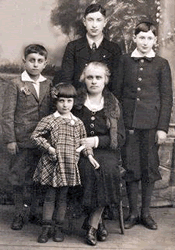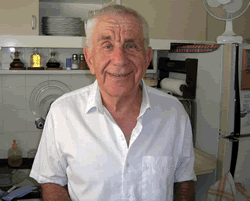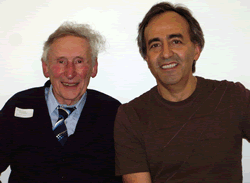Return
to Volozhin Stories Menu
Holocaust Survivors Reunited After 67 Years



For the first time since 1940, Moniek Garber of Glasgow, Scotland and Moshe Porat-Perelman of Kfar Saba, Israel spoke on the phone August 29, 2007 due to the efforts of Michael Tobias of Glasgow, Scotland, Joyce Field of West Lafayette, Indiana, USA and Eilat Gordin Levitan of Los Angeles, USA.
Garber and Porat, first cousins and best friends, grew up in Volozhyn, Belarus ( then Poland). Separated during World War II, each believed the other had not survived the Holocaust. Garber was thought to have died in battle fighting the Germans at Monte Cassino, Italy, in 1944. Garber has been in Israel three times searching for relatives, but never found any.
Porat has been very active in the Volozhyn Committee in Israel. He is the head of the Volozhin society in Israel and did much to preserve the Jewish sites in Volozhin, Belarus. Moshe Porat was a friend of Eilat' aunt, Bela Salitarnik Z"L. Bela intrduced Eilat and Moshe, since Eilat created a page for Volozhin, Moshe sent her some translations. Eilat submited Moshe's first translations to JewishGen's Yizkor Book Project, managed by Joyce Field. Moshe translated the yizkor book for Volozhyn from Hebrew, Yiddish and Russian into English. http://www.jewishgen.org/Yizkor/volozhin/volozhin.html >
Garber, a member of the Association of Jewish Refugees http://www.ajr.org.uk/, was planning to attend their September 2 meeting and in the evening of August 28, he contacted the speaker, Tobias, to give him some background on the Garber / Perelman families. Tobias started to research the families on the JewishGen website, studied the translations from the Volozhyn Yizkor Book, and recognized the family connection. Excited, he immediately emailed Field for contact information on Porat, but soon discovered that he had moved. Field recalled that Eilat was close to Porat and gave Tobias her phone number so he could get Porat's new contact information. Eilat managed to contact Porat's family for his new phone number.
Porat had moved from Tel Aviv to Kfar Saba. Early in the morning of August 29, the two cousins spoke to each other after 67 years of separation. They hope to meet in Israel in November and Garber also plans to meet his other cousin, Sonia, Porat's sister, who lives in Paris.
The cousins are direct descendents of one of the most famous rabbinical families in modern times. They descend from Rabbi Chaim of Volozhyn (the principal disciple of the Vilna Gaon) who founded the 'mother of yeshivas' (Torah study Institution) there in 1803.
Additional details and a chronology of events follow. Photographs are also attached.
Moniek Garber – the War Years
• He was arrested in March 1941 and sent to the Soviet Gulag camps. He was sent to the Baltic White Sea Canal, but the Finns attacked in 1941 to regain their territory. They walked around the White Sea for a couple of months, all the way to a Gulag called Plesieck (famous later for the first Sputnik launches).
• He did not do heavy work. He was befriended by a geologist who ensured that Moniek did not have to go out to work as he was only 18. His feet were badly frozen in any case from walking without shoes
• He was released from the Gulag in January or February 1942. They walked from the camp to the nearest station - about a two-day walk.. They then travelled by open trains, scrounging for food. He was supposed to go to the Urals to work in the copper mines but he then learned that a Polish army was forming.
• In that severe winter the Polish army first was stationed at the foot of the Ural mountains, which was the passageway between the Caspian Sea and the Urals. From there they went to Tashkent and from there over the Caspian to Teheran to the port of Pahlavi (named after the then Shah of Persia, but now called something different). They stayed some time in Persia , starving and looking skeletal. From there they stopped off in the desert for several weeks, near Baghdad. Eventually they were taken by Sikh drivers to Palestine, where the Polish Army had their distribution / enrolment centre.
• They were stationed somewhere near Tel Aviv. There he met a Jewish driver and Moniek explained that he had a grandfather PERELMAN, Rabbi in Jericho. (According to Moshe Porat this Rabbi changed his name to MARGOLIS, Hebrew for "Pearls.") The driver said the Rabbi had died the previous year (1941).
• Moniek was part of a group of the Polish army who were to head to the UK. Their task was to transfer prisoners of war.. They went to Suez to pick up Italian prisoners for transport to South Africa, where they dropped them off. They spent a few months in Pietermaritzburg, South Africa [now KwaZulu Natal] . Then they took on board German prisoners because the German prisoners had been disappearing among the Boers and were hard to trace and, therefore, they wanted to move them from South Africa to Canada. The journey to Halifax, Canada took several weeks. They dropped off the German prisoners and took onboard a large number of American soldiers. They sailed in convoy to Gourock, Scotland. This was still 1942 and Moniek was just 19 years old.
• Because of Moniek's age, one of the officers arranged lessons for him and three others. One of the others was a Polish soldier called DOMBROWSKI, who was descended from a famous Polish General . Another was a Jew called LAX, who went to Israel eventually. Moniek joined a Polish unit in Dalkieth near Edinburgh—the First Reconnaissance Regiment armoured cars). All this time the officer gave lessons. He was then sent for eight months to Glasgow, staying in the Dalbeth convent at the top of London Road, where he had more lessons there. While there they were visited by a famous local politician called DOLAN.
• He was still in Glasgow early in 1944. From Glasgow he went for War training in the Yorkshire Moors in England. He then went to Normandy, landing five days after the initial landings, as a tank gunner, a job he describes as horrible: hot, poor ventilation, lots of smoke when the guns were reloaded. In winter 1944 they were on the Ems river (an estuary of the Rhine).
• He ended up in North-Western Germany, just south of Bremen, where he started meeting people from concentration camps. Moniek had known how bad the War had been but he had not been aware of the scale of the atrocities. The first people he met were Polish girls from the Warsaw rising. One of them, a girl from a prominent family, had been operated on by Mengele.
• Unknown to Moniek at this time, while he was in North Western Germany in the Polish Army, his cousin Moniek PERELMAN was in North Eastern Germany in the Red army.
Moshe Porat–Perelman – the War Years
• On 13 April 1940 Moshe (15), his sister Sonia (10) and mother Etl (43) were deported from Volozhyn. His father was in the Volozhyn NKVD prison (sharing a cell with Moniek Garber). He never saw his father again. [NKVD = Narodny Komissariat Vnutrennikh Del , the Soviet Secret Police, a forerunner of the KGB.]
• They were taken by horse-drawn cart to Horod'k train station where they boarded a freight car, travelling East for two weeks. Through the window grill and cracks in the gate they saw the rivers Dniepr and Volga and the towns Minsk, Smolensk, Kazan, the Ural mountains. They travelled on the Trans Siberian Railway to Omsk and the Irtish river. At Tatarskaya they turned south and saw people with Mongolian faces. Their destination was Pavlodar on the east bank of the Irtish river. They were given a choice of working in gold mines, coal mines ,or on farms. They choose farming.
• They travelled upstream on the Irtish river 100 km to Krasnokutsk and then a further 100km to Novotroitsk Sovhoz, their final destination, arriving 1 May 1940. They were housed in the camel's stables. Sonia went to school, Etl worked in the vegetable fields, and Moshe worked in construction. Eventually their house was ready, which they shared with two other families. They corresponded with his grandmother in Moscow and his cousin Dania Garber in Stalinabad.
• In the Spring of 1943 Moshe was mobilized into the work army – "Trud Armia." He was sent back to Pavlodar and he worked on railroad construction between Stalinsk to Magnitogorsk in the Urals. His section (the 8th) was constructing a railroad bridge over the Irtish river, transferring coal, steel rails, wood, and nails by hand.
• The Polish Anders army was created and Polish Gulag prisoners were released. Many of the Volozhyners returned to Pavlodar, including his mother and Sonia. Moshe was still working on the railroad. In the Spring of 1944 the bridge construction stopped and Moshe Perelman was transferred from Karaganda to Aksakarovka. He befriended an official and got a clerk's job in the small Andreyevka station. He used to transport sacks of bread from Aksakarovka to Andreyevka, travelling on the outside of the trains and throwing the sacks onto the platform. Then in the autumn of 1944 Moshe was mobilized into the Red Army.
• Moshe made the long journey from Karaganda to Alma Ata, a large military training unit. This journey is about 1000km as the crow flies, but by train they travelled 4000 km. From Karaganda north to Petropavlosk, then east to Novosibirsk, then south to Alma Ata. After two months of training his squad was sent to escort a penal company to the front. The journey took a month, with little sleep or food. Through the Urals, the Volga, Ukraine, they crossed the Black Sea on a ship. From Odessa to Constanza, through Romania to Hotvan and from there to Slovakia. The penal company was left with the 4th Ukrainian Front and Moshe and his squad returned to Alma Ata via Hotvan, Kishinev, Kiyev, Moscow and Kooybishev. In Moscow he managed to see his grandmother Malka and aunt Fania.
• In Alma Ata they trained for the battle front and in February 1945, were issued new equipment and travelled by train to a special destination on the 2nd Belarussian Front. They passed Smolensk and Minsk to Lida. Moshe knew they would pass through Horod'k, the Volozhyn station, but the train did not stop. At the next stop, Bogdanovo, the station for Vishnievo, he stopped at the station office and was told all the Jews of Volozhyn had been killed. The train eventually stopped in Eastern Prussia and they left the train because the bridge over the Wisla river near Grudziądz was down.
• They then travelled by foot, marching over Pomerania and Prussia, passing Chojnice on the old German-Polish border where the World War II had started. They crossed the Oder and after a long hard walk arrived in the Greyswald forest between Barth on the Baltic Sea and Rostock on the south. They became part of an Infantry Unit, 2nd Belarussian Front. In June 1945 they moved east to Szczecin, then south to Silesia. They stayed in that vicinity until May 1946 when he was liberated from the army, leaving as a sergeant.
• Moshe returned to Szczecin in Poland where his mother and Sonia had settled after they left Pavlodar. Some of his Malkin cousins had survived and were living in Palestine. They urged Moshe and his family to join them. Moshe decided to go, heading first for France. Moshe travelled to Berlin and then he crossed from the Soviet zone into the British zone. A few days later he crossed into the American zone. >From there to Munich, and then Landsberg. A few months later he crossed into the French zone. He arrived in Reutlingen and with the help of Yuta Plavner, he was given identity papers as an officer in UNRA (United Nations Relief and Rehabilitation Administration). He crossed the French border and arrived in Metz.
• Moshe lived in France for 21 months until June 1948. He went to the ORT school. His mother and sister joined him in July 1947. He made aliya to Israel on 11 June 1948 on the ship Altalena, arriving 20 June 1948.
• Moshe served in the Israeli army, participating in operations "Nizana" and "Eylat". His war came to an end in 1949.
Moshe Porat wrote the story of M. Garbers father;
www.eilatgordinlevitan.com/ volozhin/vol_pages/stories_yani.html - 8k -
if you scroll down www.jewishgen.org/yizkor/volozhin/vol490.html
Here is what he wrote about is cousin; Monia, Yani's younger son, carried out a prank during the Russians' rule. He tore Stalin's mustache from a wall journal at the Volozhin high school. The Soviet NKVD did not like such pranks. Monia Garber was arrested in March 1941 and was sent to the Soviet Gulag camps. After the Stalin-Sikorski agreement in 1942, he joined the Polish Anders army. With this army he reached Israel via Teheran. He could not remain in the Land and was obliged to go to Italy with his Polish unit.
Monia (Moshe) Garber was killed in the Monte Cassino battle against the Germans as a soldier of the Polish army
**************************************************************************************************************************************************************************
Michael Tobias and the Association of Jewish Refugees (AJR)
• Michael Tobias is Vice President, Programming, of JewishGen, Inc, < http://www.jewishgen.org>, and lives in Glasgow, Scotland.
• In March 2007 he was asked to give a talk at the Northern Group meeting of the AJR (Association of Jewish Refugees < http://www.ajr.org.uk/>. Michael's presentation was about how he had used the JewishGen website to research two families and eventually enable a young couple to get married in an orthodox synagogue in London. The presentation was well-received and Michael was asked to return on September 2nd to demonstrate the JewishGen website. He asked those attending to contact him beforehand if they had any particular research interests or families they wanted to try to trace.
• On Tuesday, 28 August 2007, at around 7pm Michael was called by Moniek Garber, who lives a few miles away. They had met briefly at the previous AJR meeting. Moniek wanted to talk about his family from Volozhyn who had an interesting history, being descended from the famous Volozyner Rabbis and associated with the Gaon of Vilna. Michael began to check the JewishGen website but found little about the families in the various searchable databases on the site. No other researchers appeared to be working on the families.
• He then turned his attention to the town of Volozhyn and found that about half of the Yizkor Book on Volozhyn (memorial book of destroyed communities) had been translated for JewishGen by its coordinator/translator Moshe Porat. He found the genealogy of the Garber and Perelman families, articles about Moniek Garber's family (including photographs of his family), and realized that Moshe Porat was the same man as Moshe Perelman, Moniek Garber's cousin. Moshe Porat-Perelman had visited Volozhyn in 1998 and was still writing in 2001. He had done no further translations since.
• Michael broke the news to Moniek Garber and said he was going to try to trace his cousin. Michael then contacted his colleague Joyce Field, JewishGen Vice President, Data Acquisition, who is in overall charge of the JewishGen Yizkor Book Project, and lives in West Lafayette, Indiana, USA . Joyce had an email address and postal address for Moshe Porat but had not heard from him for some time. The addresses were out of date. Michael found other references to Moshe Porat on the Internet, including postings he had made on other Holocaust-related sites in 2002, then 2003, 2004, 2005, and finally in September 2006. Many of those postings were on sites maintained by Eilat Gordin Levitan. Joyce Field knew Eilat from the Yizkor Book Project and gave Michael her telephone number and email address.
• Around 1:30am UK time Michael called Eilat in California and explained the situation. She was thrilled as she knew Moshe Porat well and knew the story of his Perelman and Garber families and of Moniek Garber, who had supposedly died in battle in Italy. She had not spoken with Moshe Porat for a few months. She was sure she could contact him, through family in the USA or her cousins in Israel.
• At 5:50 am UK time Michael received an email from Eilat saying she had spoken with Moshe Porat's 14 year-old granddaughter. Moshe was alive and well and living in Kfar Saba, having moved from Tel-Aviv to be closer to his family.
• At 8:00 am UK time Michael called Moshe Porat-Perelman and confirmed the news. He gave him Moniek Garber's postal address and telephone number. He then called Moniek Garber and gave him Moshe Porat-Perelman's details. Later that morning the two cousins spoke for the first time in 67 years.
************************************************************************************************************


